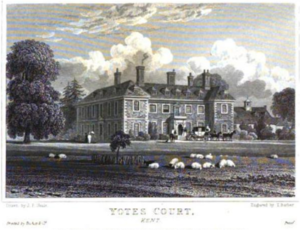Difference between revisions of "MRP: James Master of Yotes Court"
| Line 1: | Line 1: | ||
| − | + | '''James Master of Yotes Court''' | |
| + | |||
| + | '''Editorial history''' | ||
| + | |||
| + | 07/10/11, CSG: Created page | ||
'''THIS ENTRY REQUIRES EDITING''' | '''THIS ENTRY REQUIRES EDITING''' | ||
Revision as of 15:44, January 9, 2012
James Master of Yotes Court
Editorial history
07/10/11, CSG: Created page
THIS ENTRY REQUIRES EDITING
James Master of Yotes Court was the cousin of Sir George Oxenden’s sister’s husband, Richard Master, whose son James Master was Sir George Oxenden’s nephew. His expense books, which were published in four parts in Archaeologica Cantiania in the late nineteenth century, provide an insight into the life of a Kent relation of similar age to Sir George Oxenden. He visited East Langdon occasionally and used his cousin James for legal advice in the 1650s and 1660s, as is seen in payments recorded in his expense book. Interestingly, Thomas Stanley inserted a codicil into his will in 166X, which appointed James Master of Yotes Court, his close neighbour, to replace one of his deceased overseers.
James Master built Yotes Court in 1659, pulling down the previous mansion on the site, which had been the property of his step-father Sir Thomas Walsingham. In 1828 the property was described in some detail:
It consists of two stories surmounted by a high roof, with dormer windows, and is built of brick, with stone quoins and dressings: a small Corinthian porch opens to a Hall fifty-eight feet long by nineteen feet wide; having on the right, a Dining-Room, and on the left of the entrance, a Drawing-room. The whole of the grounds comprise about one thousand acres, of which the house, garden, and shrubberies, immediately adjoining, occupy six acres; the water in the park, from whence all the ponds in the neighbourhood are fed, extends over five or six acres, and there are about three hundred acres of cover. From the principal entrance to Yotes Court, in the Mereworth Road to Forge Gate, is a beautiful drive of nearly a mile.
An 1889 Order of the Land Commissioners scheduled the Yotes Court estate, then owned by Viscount Torrington, and described it as comprising nine hundred and forty acres, which the schedule broke into thirteen blocks, with land in both the parishes of Mereworth and West Peckham. However, no information is available on the size of the estate at the time of the construction of Yotes Court.
Yotes Court, built 1659
Sources
‘The expense book of James Master, pt. II, A.D. 1655-57', Mrs. Max Dalison transcribed, Canon Scott Robertson, Archaeologica Cantiania, vol. 16 (London, 1886)
‘Expense-book of James Master, pt. III, A.D. 1658-1663', Mrs. Max Dalison transcribed, Canon Scott Robertson, Archaeologica Cantiania, vol. 17 (London, XXXX),
‘Expense-book of James Master, Esq. Pt. IV’, Archaeologica Cantiania, vol. 18, pp. 114-XXX
‘The life of James Master’, Archaeologica Cantiania, vol. 18, pp.157-168
Mereworth and West Peckham document]: Scheduling of Yotes Court Estate: Official copy of an 1889 Order by the Lands Commissioners scheduling this 940 acre Estate owned by Viscount Torrington
'Yotes Court', in J.P. Neale, Views of the seats of noblemen and gentlemen, in England, Wales, Scotland, and Ireland,vol. 4 (London., 1828), p. unnumbered
